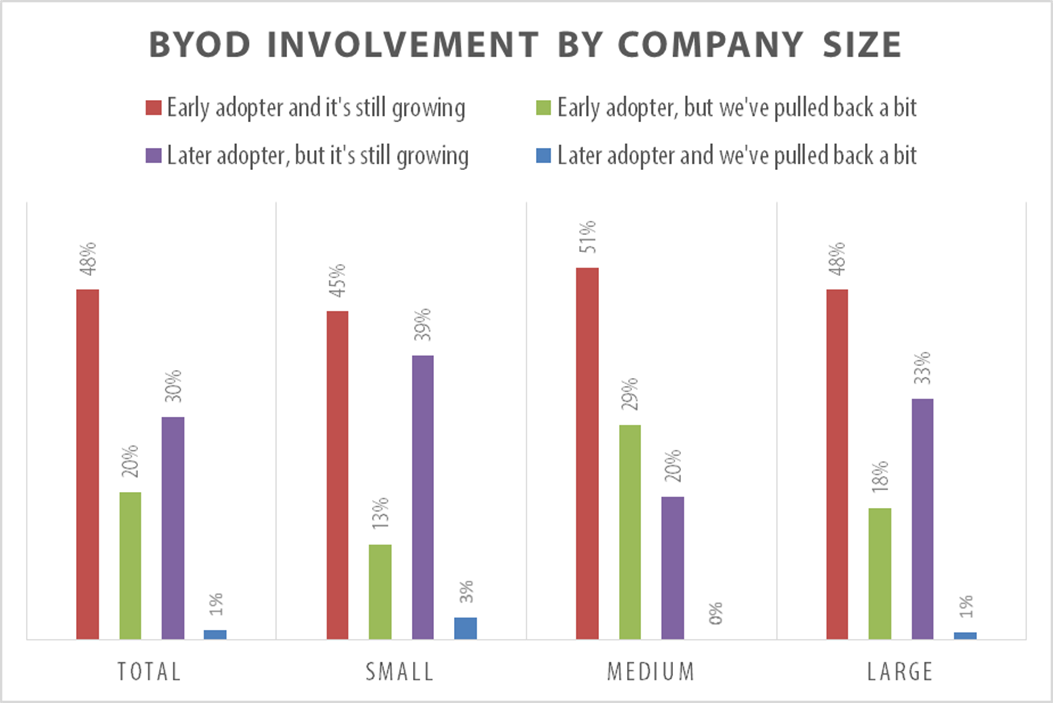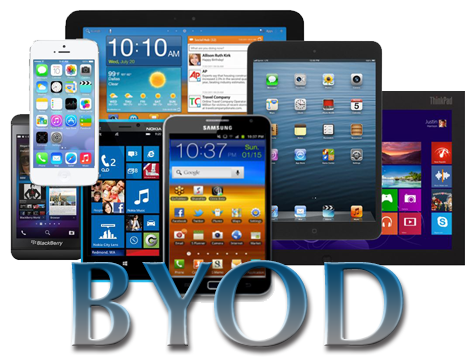The concept of Bring Your Own Device (BYOD), where individuals purchase and bring device(s) of their choosing into the workplace and use them alongside or in place of company purchased assets, has been around long enough it’s easy to think it’s readily established and well understood. But a recently completed survey of just over 750 US-based employees and IT decision makers by my firm, TECHnalysis Research, suggests otherwise. The results paint a relatively complex portrait of the current reality–while BYOD is strong and on the rise in many ways, it’s also facing a number of growing pains that clearly illustrate challenges both now and in the future.
A few basics first. The survey upon which this study was based was fielded two weeks ago among 452 employees and 302 IT workers evenly split among small companies (10-99 employees), medium-sized companies (100-999 employees) and large companies (1,000+ employees) spread across a wide range of industries. The initial sample pool was much larger however, and results from that group of 2,814 individuals show just barely under half (49.5%) of the respondents said their company had some type of BYOD policy in place.

© 2014, TECHnalysis Research, LLC
Depending on your perspective, that’s a classic glass half empty/half full dichotomy. It shows both a huge opportunity for vendors eager to create solutions that help companies enable BYOD as well as the fact that despite years and years of efforts, only half of US-based companies have started to address the interest. Of course, the BYOD adoption numbers could be a bit higher as nearly 12% of respondents (most likely employees) didn’t know whether their company even had a policy. While that might seem odd, throughout the survey results there was a clear and noticeable gap in understanding between IT decision makers and employees on the topic of BYOD. In fact, one of the key takeaways from the report is IT needs to do a significantly better job at communicating their company’s BYOD policy and the specific elements that are or are not included in it.
Of those with any kind of BYOD culture, approximately 40% said their companies had a formal policy, while the remaining 60% said they only had an informal policy. This suggests that, in most cases, IT is simply reacting to the reality of employees bringing their own devices into work rather than proactively tackling the challenge. Part of this may be due to the sophistication, or lack thereof, of the tools IT has at its disposal for implementing BYOD programs, as well as the complexity of the problem, but it strongly implies BYOD continues to go through a maturation process.[pullquote]20% of all IT decision-maker respondents with BYOD programs and 29% of the medium-sized business group said they have started to pull back a bit from their earliest efforts.”[/pullquote]
Even more telling is 20% of all IT decision-maker respondents with BYOD programs and 29% of the medium-sized business group said they have started to pull back a bit from their earliest efforts. As with many tech industry phenomena, the pendulum often starts to swing back after the initial hype around a topic has begun to fade. These numbers clearly show there are some serious concerns IT departments have had to face after the sometimes “Wild West-like” atmosphere of early BYOD deployments–where a level of “digital lawlessness” took hold. Balancing data security and freedom—which is essentially the key problem for BYOD—is an ongoing challenge ITDMs, and the vendors supporting them, will need to keep revisiting on a regular basis.

© 2014, TECHnalysis Research, LLC
Another challenge is the manner in which IT is approaching the task of managing devices used for BYOD. As discussed in last week’s column (“The Mobility Myth”), the devices used by employees in today’s business environment is a much more conservative mix than many might suppose. In fact, the PC is still king in business. Because of that, IT’s approach to BYOD often reflects a more conservative perspective. Many companies are focused on trying to manage smartphones and tablets as if they were PCs, which is likely contributing to some of the challenges and concerns that ITDMs expressed throughout this research.
On the other hand, most employees are clearly (and perhaps not surprisingly) enthusiastic about BYOD, although with some reservations. Only 8% of employee respondents in companies with BYOD programs said they do not participate in them. A majority of the remaining 92% who do participate enjoy the freedom and flexibility these programs provide, but a reasonable 13% of respondents (17% in large companies) expressed concerns around potential invasions of privacy from BYOD policies and 22% said their program was just OK.
There’s no question that BYOD is an important, ongoing trend that will continue to influence how our workplace environments evolve. But there’s also no question BYOD is far from mature and still in need of work and evolution—a potentially lucrative opportunity for companies ready to take on the challenge.

Why are companies trying to manage smartphones and tablets as if they were PCs? Are the individuals in IT really that dumb?
People tend to do things that are familiar to them (and use tools that are familiar to them), so it’s not so much a question of being dumb, but perhaps a bit lazy and conservative when it comes to this issue. There are lots of MDM (mobile device management) solutions on there specifically targeted towards managing smartphones and tablets in business, but not all of them work how, or as easily as people might like. As with many tech products, sometimes the devil is in the details of how you implement an idea or concept.
When I was working for my past employers, they were to keep their grubby paws off of my machines. I made them buy the equipment they expected me to use.
My former employer forbade all forms of personal email, for instance. The web was also heavily filtered. I didn’t like it, but it was their right. They owned the machines. Just as it’s my right to impose my policies on the machines I own.
Yes, the law is very clear that any company you work for owns any work-related data and communications that reside on whatever machines you happen to use, but particularly ones they purchase. Where things start to get messy, of course, is the personal data on work-purchased machines and, obviously, persona data on personally-bought machines. Many companies are starting to look seriously at the concept of “containers”, where work data and applications can be separately managed from personal data and applications. In fact, 57% of IT respondents in this survey said they were doing so. If properly implemented, these can go a long way to towards making people device-independent and easily able to use either work or personally-bought devices.
As someone who does a lot of traveling for work, I’ve always operated under “BYOD” because I hate carrying two cell phones, laptops, printers, etc. Toting two laptops through an airport is crazy. Plus, since I still do some freelance work, it is easier on me to have all my work on one set of devices. At that point it is helpful, for tax purposes, to have the company provide written policies in exchange for me not needing them to pay for the devices. Otherwise, the IRS auditor likely won’t let you take the deduction.
But even without a formal policy and tax deductions, I would still BYOD at my own expense to keep my physical and computing life simple. But like klahanas, it is always with the understanding that these are _my_ devices.
Joe
Joe, yes, totally agree. And, as you’ll see in my reply to klahanas, I think the trick to solving some of these challenges will be solutions that enable “containers” or different personalities on the same machine. They aren’t perfect yet, but a number of companies are working in this area and I expect we’ll see more developments here over the next few years.
Superb post however I was wanting to know if you could write a litte more on this topic? I’d be very grateful if you could elaborate a little bit more.
Very nice blog post. I definitely love this site. Stick with it!
There is some nice and utilitarian information on this site.
Hi, yeah this piece of writing is truly good and I have learned lot of things from it on the topic of blogging. thanks.
I always used to read post in news papers but now as I am a user of internet thus from now I am using net for posts, thanks to web.
Hi there are using WordPress for your blog platform?
I’m new to the blog world but I’m trying to get started and create my own. Do
you need any coding expertise to make your own blog?
Any help would be greatly appreciated!
I’ve learn a few just right stuff here. Certainly price bookmarking for revisiting.
I wonder how a lot effort you put to create the sort of excellent informative website.